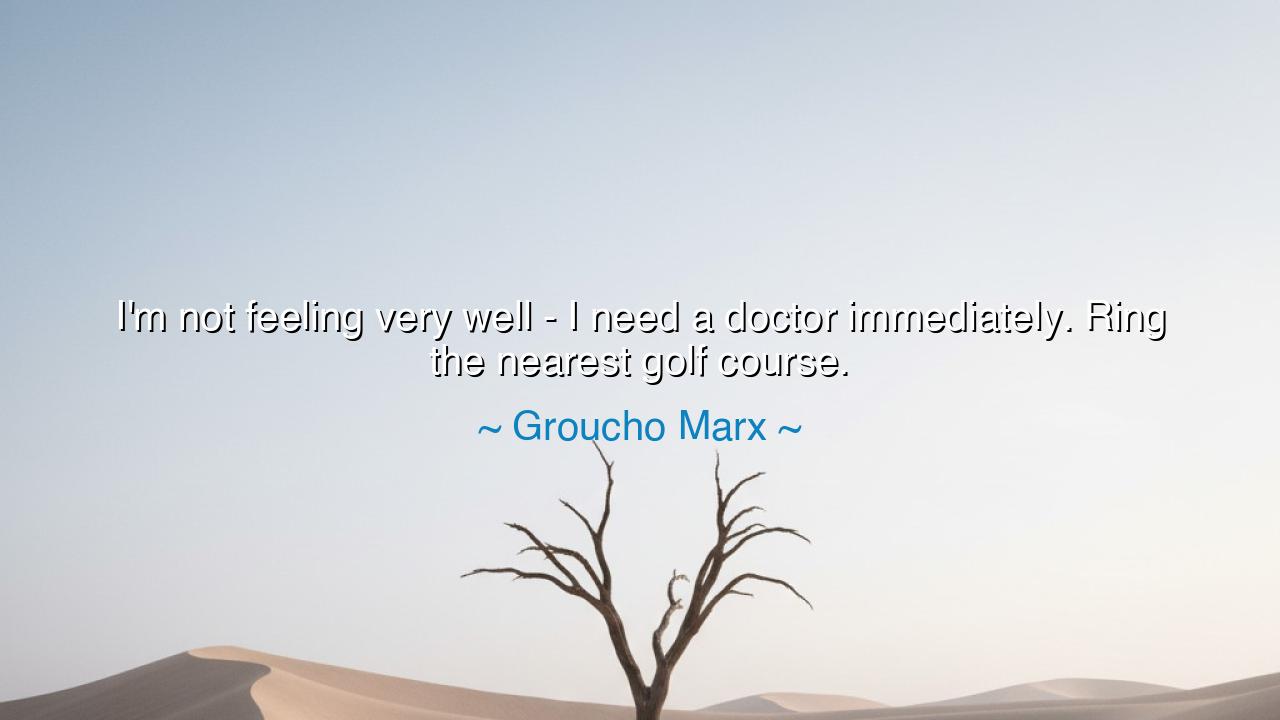
I'm not feeling very well - I need a doctor immediately. Ring the






In the pursuit of wisdom and clarity, there are times when we encounter phrases that both bewilder and amuse, yet hold beneath them layers of deeper meaning. One such phrase, spoken by the legendary Groucho Marx, is: "I'm not feeling very well - I need a doctor immediately. Ring the nearest golf course." At first glance, this utterance may seem nothing more than a jest, a play on words crafted in the style of the great comedian. But, as with all words of substance, even the most light-hearted sayings can carry profound implications.
The essence of this quote lies in the intertwining of two seemingly unrelated concepts—illness and the golf course. The juxtaposition of the two invokes not only humor, but also a reflection on the nature of modern life's distractions. In a world where people are often seeking remedies for both their physical ailments and their spiritual discontent, Groucho Marx wittingly suggests that, rather than turning to traditional medicine, one might find solace on the golf course—a space where leisure and escape from worldly troubles collide. It is here that the humor takes on a deeper layer: by calling for a golf course rather than a doctor, Groucho alludes to the idea that sometimes what we seek is not healing in the conventional sense, but simply distraction from our pain, an outlet for our frustration.
In the realm of the ancients, philosophers and sages often sought to understand the causes of human suffering. Was it the body that caused our miseries, or did the mind hold the key to our inner turmoil? In this light, Groucho’s words echo the timeless struggle between self-awareness and escapism. When faced with challenges, human nature often bends toward a desire to avoid discomfort, to seek refuge in something external—be it leisure, wealth, or even humor itself. Groucho’s playful line serves as a reminder of this universal tendency. Though his humor was lighthearted, it reflects a deeper truth: that in moments of distress, we often seek the comfort of distraction instead of confronting the cause of our affliction.
Consider, if you will, the ancient teachings of Socrates, who famously stated that "an unexamined life is not worth living." In contrast, Groucho’s remark highlights the human instinct to avoid examination, to seek the path of least resistance, even when it leads us further from the truth. The golf course, in this sense, becomes a metaphor for all the distractions that keep us from engaging deeply with the truths of our own lives. Rather than confronting sickness or discomfort head-on, we retreat to the easy answers, the surface-level solutions that provide temporary relief but no lasting cure.
To illustrate this more vividly, let us consider a modern-day example. In a world filled with constant noise and distraction, many turn to entertainment, social media, and material pursuits as a means of coping with deeper emotional pain. Just as Groucho sought solace on the golf course, so too do we often seek refuge in fleeting pleasures rather than confronting the deeper, more meaningful issues that plague us. The lesson here is clear: it is easy to become enamored with distractions, but true healing comes only through self-reflection and facing the challenges that lie before us.
As we ponder the wisdom behind Groucho Marx's playful words, we must remember that humor is often a mirror reflecting the truths we are too reluctant to face directly. Groucho’s wit challenges us to laugh at our own tendencies toward avoidance, but it also urges us to consider a different approach to our discomforts. The golf course, though an escape, can also symbolize the need for moments of rest and renewal. Yet, we must balance these moments with the courage to confront our struggles, lest we fall into the trap of perpetual distraction.
In closing, the words of Groucho Marx remind us that we are creatures of both humor and depth. His playful quip carries an invitation to reflect on our own coping mechanisms and distractions, urging us to examine whether we are truly healing or merely passing time. The lesson here is not just about laughter, but about understanding that in our times of discomfort, we must ask ourselves: are we seeking true healing, or simply a temporary respite? By embracing both self-awareness and balance, we can navigate the course of life with wisdom, and when needed, pause to rest—not in avoidance, but in true renewal.






AAdministratorAdministrator
Welcome, honored guests. Please leave a comment, we will respond soon